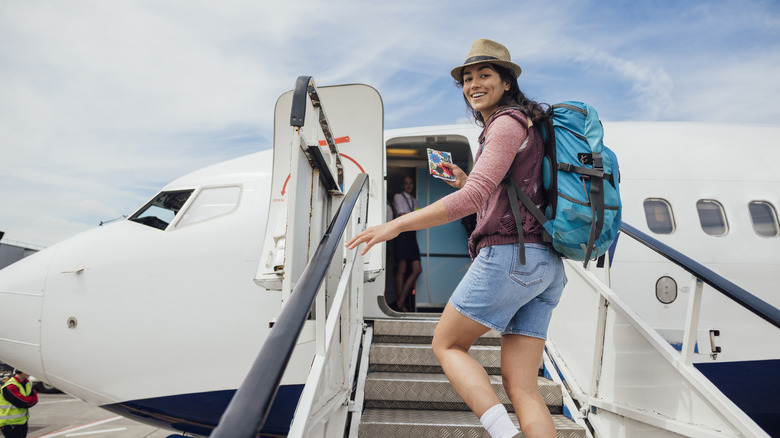This Is The Science-Approved Ideal Length For A Perfect Vacation And Here's Why
When it comes to vacations, we often find ourselves pondering the ideal duration. Not too short to leave us wanting, yet not long enough to evoke the stress of piled-up work awaiting our return. Is a three-day getaway enough? Or should it be closer to three months? A travel study published in the aptly-named Journal of Happiness suggests that an eight-day vacation might strike the perfect balance.
Why is eight the magic number? The study's researchers have found that the vacationer will experience an increase in happiness that peaks specifically on the eighth day, after which the heightened feelings of well-being start to wear off, eventually returning to pre-travel baseline levels.
The concept of an eight-day vacation as the ideal length is grounded in several theories. Firstly, it aligns well with what is known as the effect-recovery theory. According to this theory, the body and mind need adequate time to recover from the stresses of everyday (non-travel) life. The first few days of vacation are often spent unwinding and disconnecting from work-related thoughts and stressors.
When relaxed, the vacationer enters a state of recovery. During this phase, the benefits of being on vacation begin to materialize — we engage more deeply with our surroundings, experience enjoyment, and our overall wellness improves. This recovery phase typically peaks around the seventh or eighth day. Hence, an eight-day vacation allows for sufficient time to fully immerse oneself in the vacation experience and reap its maximum psychological benefits.
The psychology behind an eight-day vacation
Furthermore, this time frame supports what travel psychologists term "novelty." When we first arrive at a new destination, our senses are heightened, and we are more attentive and emotionally invested in our surroundings. According to a study published in the Annals of Tourism Research, "Findings affirm that novelty is indeed fundamental and enjoyable in the tourism experience."
However, over time, we adapt to these new surroundings, and the novelty begins to wear off — such is human nature, unfortunately. An eight-day span strikes the perfect balance between experiencing novelty and avoiding the point at which it begins to fade and the "newness" of your trip becomes normalized.
Physiologically, the length of the vacation impacts stress hormones, such as cortisol. A shorter vacation doesn't provide enough time for these hormone levels to normalize, especially if you're traveling across time zones and combating jet lag. You have to return before you can even relax! However, an eight-day vacation (that isn't cross-continental) is long enough for the body to reduce these stress hormones, leading to better mood, sleep quality, and immune response.
Another aspect is the practicality and sustainability of an eight-day vacation. It's long enough to travel to a distant location without feeling rushed, yet not so extended that it becomes a logistical or financial burden. This length might also prevent the common post-vacation slump, especially upon returning to work. A vacation that is too long or too short often leads to a more challenging reintegration.
Itineraries, memories, and PTO
An eight-day duration allows for a balanced itinerary. It provides ample time to explore, relax, and have days with no agenda, which are essential for a sense of true freedom. The eight-day study states that "control or the freedom to decide which activity to engage in is strongly associated with improvements in well-being across a vacation period."
In terms of memory formation and retention, the eight-day span is also optimal. According to the "serial position effect" theory, our brains remember the beginning and end of an event better than the middle. An eight-day vacation is succinct enough for both the start and end to remain vivid.
Moreover, the eight-day period aligns closely with the average workweek, making it a feasible option for most working professionals with limited paid time off (PTO). Mary Helen Immordino-Yang, a professor at USC, says, "When you pick an eight-day vacation, you have replaced one unit of work with one unit of relaxation, plus a day to get there" (via GetPocket).
Nevertheless, the positive effects of vacations wear off quickly upon return. What's the point of vacations at all, then? First, taking an annual vacation reduces the chances of cardiovascular illness and premature death. Second, "Asking why we should keep going on vacations is ... comparable to asking why we should go to sleep considering the fact that we get tired again" (via Springer Nature). So, vacation away — and keep it at eight days (or whatever you know works best for you)!


